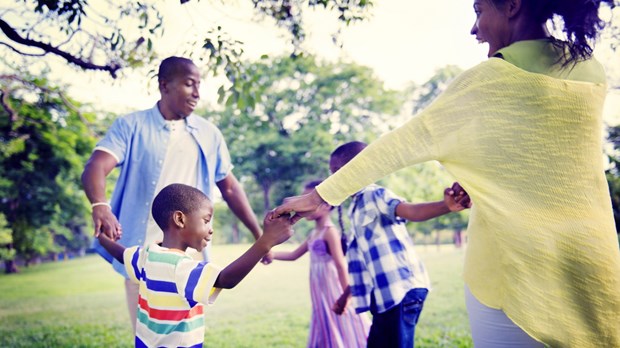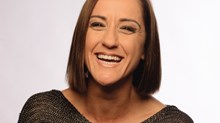Blindsided

I was writing a humor column on money and marriage when the phone rang. Letting it ring, I finished the sentence: "Someone stole my VISA card, but I haven't reported it yet. The thief is spending less than my wife." Then I picked up the receiver. There was silence at first, then my wife's voice, speaking the words I've never forgotten: "H-h-help me, please help me. I don't know what's happening . . . "
Normally it's a five-minute jog from my office to our house, but I'm sure I was there in two. Bursting through the front door, I found the kids on the kitchen floor pouring Corn Flakes into a stainless steel bowl. "Daddy, is Mamma gonna die?" asked the eldest, five-year-old Stephen.
On the living room couch lay Ramona, my wife of nine years. An ugly gash ran up her left leg, and blood had stained the carpet. Staring at me with vacant eyes, she asked, "What day is it? It's Monday, right?"
It was Friday, April 10, 1992. The first day of a journey down a road we would never have chosen.
Until that day, life had been everything we had hoped for. We'd had three kids in three years and we couldn't have been happier. I often joked with Ramona: "Sure we have three kids, but we're far more satisfied than the guy who has three million dollars."
"How so?" she asked.
"Well, the guy with three million wants more!"
We had a close family, an improving marriage, even a car that started. And my first book had just been accepted by a publisher.
Early in January 1992, however, things began to change. Waking up in the middle of the night, I'd find Ramona pacing the floor. "What's wrong?" I'd ask.
"I'm fine," she'd reply. "I just can't sleep."
Finally one night she broke down and told me, "I'm hardly sleeping. I'm thinking about this disease that's in my family."
The disease was Huntington's, a rare neurological disorder. On the scale of human misery, the disease ranks high, bringing mental and physical deterioration, then nursing homes and life support systems. "My dad had it before he drowned and I have a 50/50 chance of getting it," she had told me when we were dating. "I thought you should know, before we get … any further along." My response was the last thing she expected: "I'd like to marry you someday, Ramona. I love you." After that I never gave the disease much thought. We were young—invincible.
But by the time our kids were born, three of Ramona's six siblings had been diagnosed with Huntington's, and she thought she was next. The symptoms were there: lack of sleep, irritability, occasional clumsiness, even a craving for sweets.
“What Happened to Mommy?”
In the morning before the fateful phone call, my wife awoke at 8 o'clock feeling dizzy. The last thing she remembers is standing up to pull on her housecoat. As she fell, her leg struck the corner of our wooden bedframe.
I wrapped Ramona's wound and headed for the kitchen. "What happened to Mommy?" I asked Stephen, who was stirring the Corn Flakes while his two-year-old brother added a generous handful of salt.
"She was making funny noises," he answered, "and she didn't talk right. She thinks I'm her dad."
I gathered my three children into my arms and held them close. "Maybe we should tell Jesus," said Rachael, who was three. "Maybe he can do something." Squeezing them tightly, I prayed out loud: "Dear God, help Mommy to be okay. And thank you that you're here with us all the time."
"Daddy," said Rachael, pulling on my ear, "can we have bweakfast now?"
As the children munched cold cereal, I called my parents. "Mom, I'm not sure what's wrong with Ramona. But can you take the kids for awhile—and pray?" Then I phoned Ramona's mother. Half an hour later she arrived with a hug. But her optimistic smile soon faded. "You're sure it's Friday?" Ramona kept asking. "It can't be."
I was flipping through a phone book for our doctor's number when suddenly Ramona's back arched and her head snapped back. An agonizing moan escaped her lips. Her face—an ashen gray—tightened, and her body slumped to the floor. Quickly I rolled her over to keep her from choking. "Dial 9-1-1!" I yelled. Ramona thrashed her arms and legs, but no breath would come. Grabbing her arms to keep her from hurting herself, I prayed, "Oh God, please, please . . . " It was the first seizure I'd ever witnessed. It would be the first of hundreds.
An ambulance came to take Ramona to a hospital 90 minutes away. I rode with my unconscious wife, clutching her hand and wondering if this was the beginning of Huntington's. A Christian nurse, a childhood friend, was with us. "I once read an interview with Linda Ronstadt," I told her. "She said, 'I'll never get married; there's too much potential for pain.' I guess I finally understand what she meant."
My friend put her hand on mine. "Yes," she replied, "but you would never have known such joy either." I didn't bother wiping my tears away.
In the hospital, the endless battery of tests began. You name it, they scanned it. "They scanned my brain and found nothing?" joked Ramona on the morning of the fourth day. I laughed and kissed her. But the outlook wasn't so funny. Doctors, psychologists and neurologists all had different opinions. "This has nothing to do with Huntington's," said one. "She's having pseudo-seizures. She'll get over it." A veteran psychologist told us that because Ramona had watched her father drown when she was eight, she had Post Traumatic Stress Disorder. "Counseling is the answer," he told me.
Back home, our doctor diagnosed her with severe depression and recommended an anti-depressant. During the next few weeks Ramona seemed to improve. My boss allowed me to carry on my editorial duties at home, and at night after everyone was asleep I put the finishing touches on my book Honey, I Dunked the Kids. In one chapter I told how our youngest son, Jeffrey, was born less than a year after his sister. "God's grace always accompanies life's surprises," I wrote. When Ramona's seizures returned with a vengeance, I hung onto those words.
Waiting for an Answer
In March of 1993, the gene that causes Huntington's was discovered at last. And so, one year after the seizures began, we drove to a nearby city for a simple blood test. "We'll be in touch," the nurse told us. But weeks of waiting turned to months. Finally I called the clinic. "Why so long?" I asked. "It's a little-known disease," came the response. "We're sorry."
In July my book came out, and I began doing radio interviews to promote it. "How can you laugh when life ain't so funny?" one talk show host asked. I talked about how our present days couldn't be described as happy ones, but strangely there were moments when they were jam-packed with joy. "Joy," I said, "doesn't depend on sunny circumstances, on good news or happy endings. It comes from knowing that whatever happens, God loves me; that whatever happens he's preparing a better place for those who love him." During the commercials I'd take a break from the interview and run to the next room to check on my wife.
Early in 1994, we were notified that the test results had come back. On February 14th, we'd know whether Ramona carried the Huntington's gene. Valentine's Day is no occasion for final verdicts, I thought. Then I realized how fitting it was. On August 28, 1982, I had stood before 300 witnesses and God himself, promising to be Ramona's sweetheart no matter what came our way. On each Valentine's Day since I had renewed that vow. I would renew it this year just like before.
On February 14, two doctors tore open the small envelope that held the test results. "Ramona, you have the normal gene."
We stood together in disbelief. "We don't have it?"
"You don't have it."
We hugged the doctors. Ramona was clear, and the disease could not be passed on to our children. That night we celebrated with a seafood dinner and a movie. Driving home we felt as if we'd come out of a long, dark tunnel. But we weren't out of it yet.
As the months dragged on, Ramona's seizures worsened. "Things will get better," our doctor kept telling us. "It just takes time." But by 1996, time seemed to be running out.
Down to a mere 90 pounds, Ramona had no appetite and rarely left the house. When she did, people in our small town barely recognized her. One day as we drove to visit her sister, another seizure laid her flat out in the front seat beside me. Terrified, the children cried in the back seat. I comforted them as best I could, and after our arrival, took them to a nearby McDonald's.
"How do you guys feel?" I asked.
"Scared," came the reply. "Is Mamma gonna die?"
"I don't know," I said. "Sometimes I'm scared, too. But you know what? God said he'll always be with us. And he's never broken a promise. You can tell him when you're scared. And you can tell me too, okay?" I didn't know if I'd said the right thing, but soon the kids were laughing and enjoying their cheeseburgers.
Uncertain Diagnosis
We had seen 21 specialists, scoured librarys for literature, and tried to diagnose the problem ourselves. Well-meaning friends suggested that demonic activity was involved, so we sought godly counsel. Our pastors prayed over Ramona, anointing her with oil. For months she met twice a week with a counselor, but still the seizures continued.
Every night we lay awake, unable to sleep. And sometimes panic overtook me. "What do I do now, Lord? Where do we go from here?" There was only silence. The windows of heaven seemed shut, the drapes pulled. Then verses my mother had drummed into me when I was a child came back to comfort me. And I would say them out loud: "God is our refuge and strength, an everpresent help in trouble. Therefore we will not fear … " (Psalm 46:1-2).
But by the fall of 1996, even hope was slipping from my grasp. The seizures were occurring daily and sometimes every half hour. I rarely left Ramona's side, and late one night, after she was finally asleep, I paced our darkened backyard and fell to my knees pounding the ground. "God," I cried, "I can't take it anymore. Please do something."
As I stood to my feet, a doctor's name came to mind. We attended the same church, but I'd never thought to ask his opinion. A few minutes later I had him on the phone. After listening to my description, he said simply: "I've seen this once before. It sounds like a rare chemical deficiency. Bring her to me first thing in the morning. There's a new drug to treat it."
I don't think I really believed in miracles before then. But within a week, Ramona was a different person. The seizures ended. Her eyes lit up with the sparkle that first attracted me to her. God had given me my wife back.
Of course, there are more tests ahead. But every day my wife wakes up beside the most thankful guy in the world. I'm thankful that God's grace does accompany life's surprises. I'm thankful that in the toughest of times his grace can help us choose joy over bitterness, and help us stay together when our whole world is falling apart.
Remember that VISA card joke I was writing the day Ramona's phone call changed my life? The truth is, I am far richer because I met this girl. I guess the only thing she's stolen is my heart.
Phil Callaway is a popular speaker, author and editor of Servant magazine. The Callaways live in Alberta, Canada.
Copyright by the author or Christianity Today/Marriage Partnership magazine.
Read more articles that highlight writing by Christian women at ChristianityToday.com/Women
 Read These Next
Read These Next
 Common PropertyHow to buy a house without making your spouse crazy
Common PropertyHow to buy a house without making your spouse crazy
 Should You Choose Your Dream Job or Your Husband’s?Within one week, we both were invited to take our dream jobs. Too bad they were a thousand miles apart.
Should You Choose Your Dream Job or Your Husband’s?Within one week, we both were invited to take our dream jobs. Too bad they were a thousand miles apart.
 Christine Caine: Abused but Not DefeatedThis Hillsong Bible teacher overcame a childhood of sexual abuse to become a fearless crusader for Christ in the fight against human trafficking.
Christine Caine: Abused but Not DefeatedThis Hillsong Bible teacher overcame a childhood of sexual abuse to become a fearless crusader for Christ in the fight against human trafficking.








 Homepage
Homepage